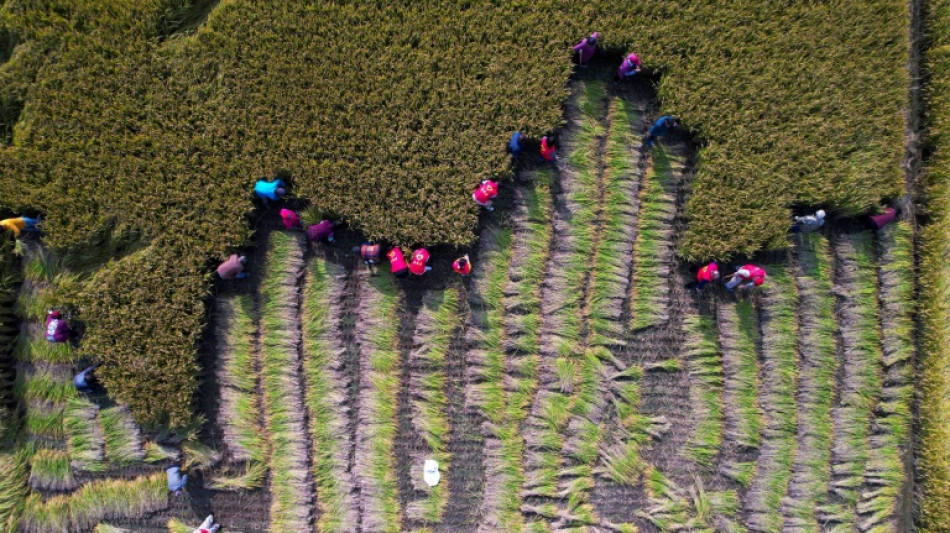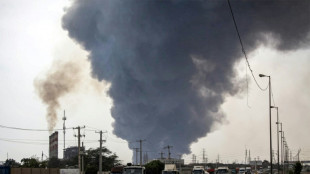
-
 South Korea's Ryu and Japan's Saigo share LPGA Chevron lead
South Korea's Ryu and Japan's Saigo share LPGA Chevron lead
-
Canada leaders make closing pitches in campaign upended by Trump

-
 De Bruyne's Man City exit 'so difficult' for Guardiola
De Bruyne's Man City exit 'so difficult' for Guardiola
-
'No regrets' for Amorim over Man Utd move

-
 Lyon and Strasbourg win to close in on Europe, Montpellier relegated from Ligue 1
Lyon and Strasbourg win to close in on Europe, Montpellier relegated from Ligue 1
-
Toulouse thrash Castres as Top 14 pursuers stumble

-
 Djokovic crashes to nervous Arnaldi in Madrid opener, Swiatek advances
Djokovic crashes to nervous Arnaldi in Madrid opener, Swiatek advances
-
Olympic champs Russell, Davis-Woodhall win at Drake Relays

-
 Browns end Sanders long draft slide
Browns end Sanders long draft slide
-
Cavs crush Heat, on brink of NBA playoff sweep

-
 Fire rages after major blast at Iran port kills 8, injures hundreds
Fire rages after major blast at Iran port kills 8, injures hundreds
-
Kiwi Beamish wins Penn Relays 1,500m crown with late kick

-
 Mbappe on Real Madrid bench for Clasico Copa del Rey final
Mbappe on Real Madrid bench for Clasico Copa del Rey final
-
England survive France fightback to seal Women's 6 Nations slam

-
 Palace sweep past Villa to reach FA Cup final
Palace sweep past Villa to reach FA Cup final
-
CAF appoint Moroccan Lekjaa first vice-president

-
 Major blast at Iran port kills 5, injures hundreds
Major blast at Iran port kills 5, injures hundreds
-
Rodgers vows to stay with Celtic after fourth successive Scottish title

-
 Ipswich relegated as Newcastle, Chelsea boost top five bids
Ipswich relegated as Newcastle, Chelsea boost top five bids
-
Canada leaders make final pitches in campaign upended by Trump

-
 Mullins -- Ireland's national training treasure
Mullins -- Ireland's national training treasure
-
US, Iran say progress in 'positive' nuclear talks

-
 Mullins emulates O'Brien with second successive trainer's title
Mullins emulates O'Brien with second successive trainer's title
-
Ipswich relegated after one season in Premier League

-
 Just Stop Oil activist group holds final march
Just Stop Oil activist group holds final march
-
Djokovic crashes to nervous Arnaldi in Madrid opener

-
 Syria's Kurds demand 'democratic decentralised' Syria
Syria's Kurds demand 'democratic decentralised' Syria
-
Leverkusen win to delay Bayern and Kane's title party

-
 Buenos Aires farewells native pontiff with tears and calls to action
Buenos Aires farewells native pontiff with tears and calls to action
-
Turkey's opposition says Erdogan's canal plan behind latest arrests

-
 Maresca hails 'nasty' Chelsea as top five bid stays alive
Maresca hails 'nasty' Chelsea as top five bid stays alive
-
Trump raises Putin doubts after Zelensky talks at pope's funeral

-
 Major blast at Iran port kills 4, injures hundreds
Major blast at Iran port kills 4, injures hundreds
-
Napoleon's sword to be sold at auction in Paris

-
 Iran, US discuss nuclear deal in third round of talks
Iran, US discuss nuclear deal in third round of talks
-
Buenos Aires farewells native pontiff with call to action

-
 Warholm sets hurdles world record at Diamond League, Holloway shocked
Warholm sets hurdles world record at Diamond League, Holloway shocked
-
US students 'race' sperm in reproductive health stunt

-
 Wikileaks founder Assange joins crowds for pope funeral
Wikileaks founder Assange joins crowds for pope funeral
-
Leader Marc Marquez claims Spanish MotoGP sprint victory

-
 Celtic win fourth successive Scottish Premiership title
Celtic win fourth successive Scottish Premiership title
-
Jackson ends drought as Chelsea boost top five push

-
 Warholm sets 300m hurdles world record in Diamond League opener
Warholm sets 300m hurdles world record in Diamond League opener
-
Major blast at south Iran port kills 4, injures hundreds

-
 Russia says retook Kursk from Ukraine with North Korean help
Russia says retook Kursk from Ukraine with North Korean help
-
Francis laid to rest as 400,000 mourn pope 'with an open heart'

-
 Trump, Zelensky meet on sidelines of pope's funeral
Trump, Zelensky meet on sidelines of pope's funeral
-
'Shared loss': Filipino Catholics bid Pope Francis farewell

-
 Families unable to reunite as India-Pakistan border slams shut
Families unable to reunite as India-Pakistan border slams shut
-
Major blast at south Iran port injures hundreds


Ozone pollution costs Asia billions in lost crops: study
Persistently high levels of ozone pollution in Asia are costing China, Japan and South Korea an estimated $63 billion annually in lost rice, wheat and maize crops, a new study says.
While ozone forms a protective layer around the Earth in the upper atmosphere, it is a harmful pollutant at ground level.
It is created by a chemical reaction when two pollutants, often emitted by cars or industry, combine in the presence of sunlight and it can interfere with plant photosynthesis and growth.
The research published Monday harnesses pollution monitoring data from the region and field experiments to show ozone affects Asia's crop yields more than previously thought.
The study's authors said the findings should push policymakers to reduce emissions that produce ozone.
"Air pollution control in North America and Europe succeeded in lowering ozone levels," said Kazuhiko Kobayashi, a co-first author of the study and professor emeritus affiliated with the University of Tokyo.
"We need to repeat that success across East and South Asia," he told AFP.
Previous estimates of ozone's effects on staple crops such as rice, wheat and maize have sometimes used varieties that are not prevalent in Asia, or tested plants grown in pots rather than fields.
To get a more accurate picture, the researchers looked at varieties common in the region and did experiments with crops in pots but also in fields.
They exposed rice, wheat and maize to varying levels of ozone and used the resulting crop yields to model how different exposures affected plant development.
They also tested the model with a second experiment in which the crops were treated with a chemical that protects against the effects of ozone, to see if the yield increased in line with their estimations.
- 'Threat to food security' -
To determine real-world effects, the researchers then applied ozone data from more than 3,000 monitoring sites in China, South Korea and Japan to their model.
They found a mean of 33 percent of China's wheat crop is lost annually because of ozone pollution, with 28 percent lost in South Korea and 16 percent for Japan.
For rice, the mean figure in China was 23 percent, though the researchers found hybrid strains were significantly more vulnerable than inbred ones. In South Korea the figure was nearly 11 percent, while in Japan it was just over five percent.
And maize crops in both China and South Korea were also affected at lower levels. The crop is not grown in Japan in significant quantities.
The researchers said their findings were limited by several factors, including that ozone monitors are mostly in urban areas and levels in rural areas are often higher.
Surface ozone "poses a threat to food security" given its effects in a region that supplies 90 percent of the world's rice and 44 percent of its wheat, the authors wrote.
"It has been well known that ozone exerts large impacts on crop production," Kobayashi told AFP.
"Nevertheless, the estimated yield loss in rice, particularly of hybrid type cultivars, may be a bit shocking for those who have learned about it for the first time."
In all, the study estimates $63 billion in annual losses, and Kobayashi said he hoped the findings would "encourage people to take action".
"We in Asia could repeat the success of air pollution control in North America and Europe, where ozone-induced crop yield loss has been declining."
F.Dubois--AMWN



